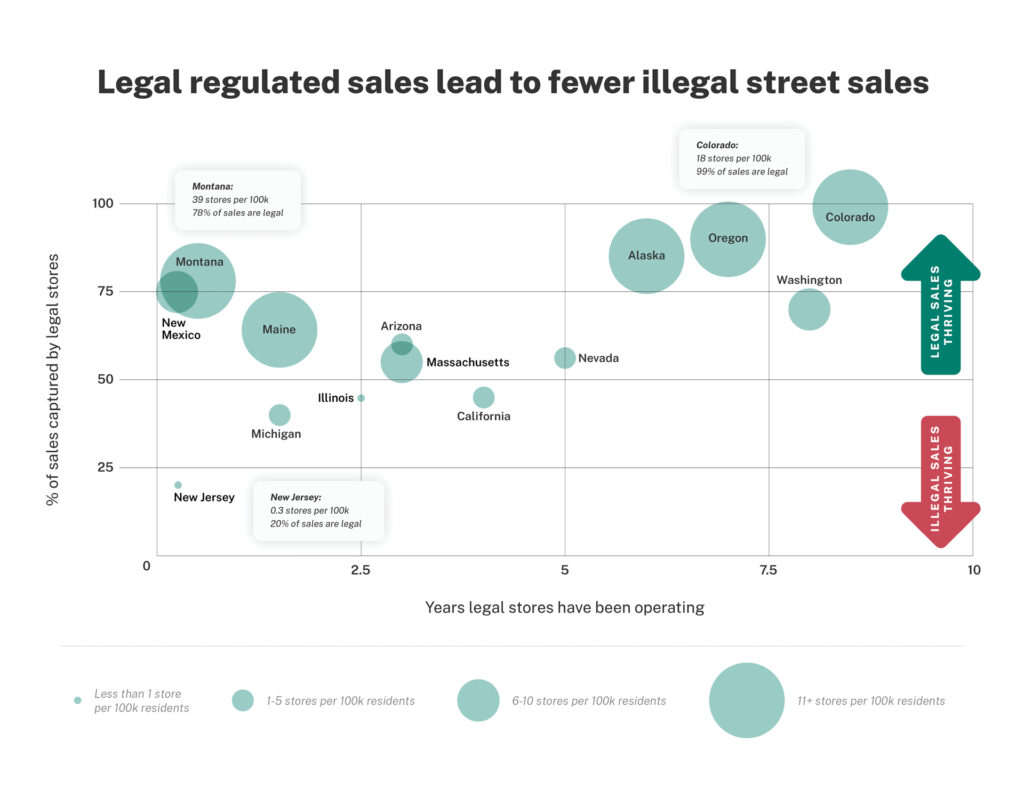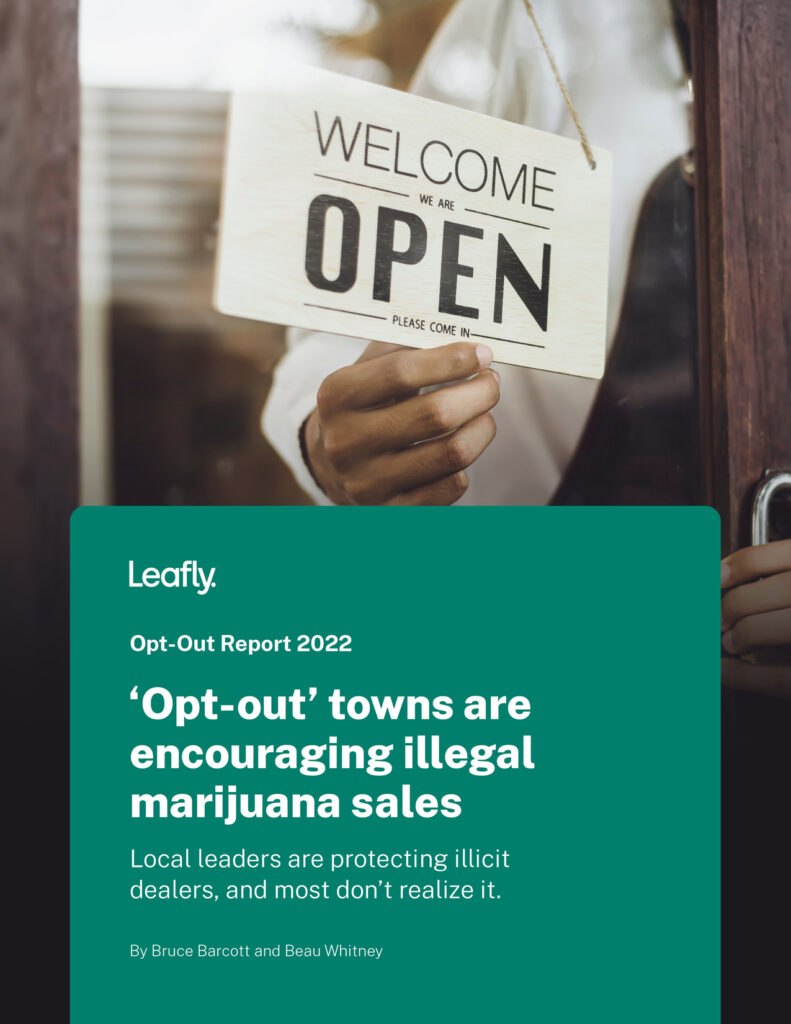
Leafly Report: ‘Opt-out’ cities encourage illicit marijuana sales
In many of America’s legal cannabis states, elected municipal officials support their community’s illegal marijuana dealers. And most of these officials don’t know they’re doing it.
Opt-out cities opt for illegal sales. And most don’t realize it.
That’s according to new research published today in The Opt-Out Report 2022, a project conducted in partnership between Leafly and Whitney Economics. In the new report, analysts and economists examined a variety of sales, population and adult market data from the 14 states with operating adult retail markets.
Data shows that the more legal shops, the fewer street vendors
By overlaying these statistics, the Leafly/Whitney team found a strong correlation between per capita cannabis shop licenses and illegal marijuana sales. In short, the more cannabis stores per capita, the fewer street dealers.

States with more legal, licensed, and regulated businesses are far more successful at putting illegal marijuana sellers out of business. States with fewer businesses tend to be home to the most robust illicit marijuana markets.
Download the full report below:

What is an “opt-out city”?
Laws legalizing cannabis in some states allow municipalities to enact specific regulations in cities and counties. But rather than regulate legal sales in a way that is appropriate for their community, it is increasingly common for local leaders to opt out of local regulations and effectively create an economic sanctuary for illegal street vendors to continue their businesses.
Illegal markets thrive in communities where legal, state-regulated businesses are not allowed.
This revival of prohibition at the local level exists even in communities that have overwhelmingly voted for legal cannabis at the national level.
Opt-out cities and counties have become a serious problem in California, where 62% of all municipalities ban regulated cannabis sales — and the illegal market still supplies 55% of cannabis demand, even after nearly four years of legal sales.
In New York, half of all municipalities have already chosen not to regulate cannabis within their borders before adult sales begin. These civic leaders have effectively created economic sanctuaries for street vendors in their communities.
In New Jersey, where adult use of cannabis began earlier this year, 71 percent of municipalities have rejected legal sales. That has left few legal options for the state’s adult consumers. With just one store for every 358,000 residents, illegal street vendors control more than 80 percent of the Garden State’s marijuana market.
The wrong assumption
In many of these opt-out cities, local leaders are voting to leave cannabis unregulated based on the assumption that doing so would keep marijuana out of their community.
That’s a wrong assumption. Decades of experience and data show that cannabis is already circulating in every community in America. Pretending marijuana doesn’t exist doesn’t magically make it go away. It just gives local street vendors a boost — and these vendors don’t ask for proof of age. State licensed stores do this.
By zoning and regulating state-licensed cannabis stores, local communities are effectively creating age limits for marijuana use. Drawn from the broad product selection of a state-licensed store, laboratory-tested goods, and enjoyable shopping experience, adult consumers are abandoning their local illegal sellers in favor of regulated stores over time. This dries up the market for illegal sellers. Fewer illegal sellers mean that underage people have fewer opportunities to obtain marijuana.
Illegal products endanger public health
In addition to inadvertently protecting their city’s illicit marijuana dealers, the report found that when local leaders choose not to, they also:
- Indirectly encourage adult consumers to buy illegal products
- Put public health at risk by allowing untested products to circulate
- Support illegal sales to local youth
- Avert local jobs and tax revenue
- Keep fighting in a losing war on drugs
Today, nearly 45 percent of Americans live in a state legal for adult use. If upcoming legalization measures are approved in November’s vote, half of all Americans could live in a legal cannabis state by 2023.
In any new rule of law, local officials are called upon to regulate cannabis in a manner appropriate to their community.
The exit isn’t a vote against marijuana—it’s a vote for illegal dealers. This report provides policymakers with a critical guide to make local regulatory decisions with research and data-backed facts.
Leafly Reports: Data for policy decisions
Bruce Barcott and Beau Whitney
Bruce Barcott is the executive editor at Leafly and executive producer of Leafly Reports. Beau Whitney is the founder of Whitney Economics, one of the world’s leading cannabis and hemp economics consulting firms.
Check out articles by Bruce Barcott and Beau Whitney
By submitting this form, you are subscribing to Leafly news and promotional emails and agreeing to Leafly’s Terms of Service and Privacy Policy. You can unsubscribe from Leafly email communications at any time.

Post a comment: